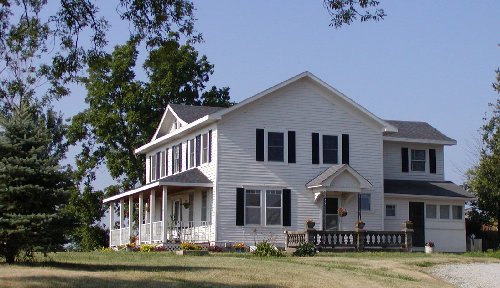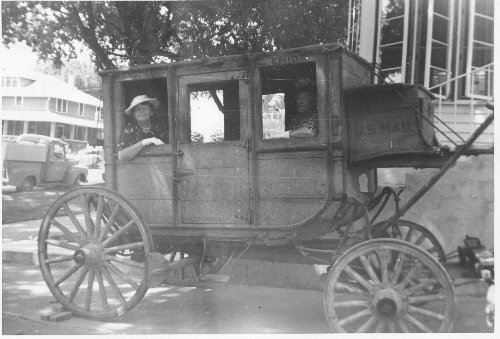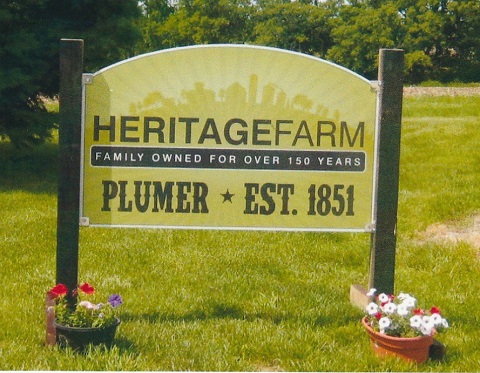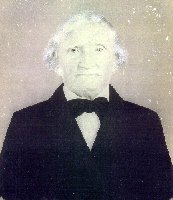"This looks good to me. Plenty of timber, water, good land. This is where we will stay." — Johann Plumer, June 1, 1851
Johann Plumer & family emigrate to Ohio
Johann Heinrich Gildehaus was born on 01 October 1795 in Tchobrink (Aschen), Kingdom of Hanover, Germany. He had been a soldier in the Prussian Army, fighting in the Battle of Waterloo with General Blucher's Army. On July 11, 1822, he married Maria Plumer in Mariendrebber, Germany, taking on the Plumer name. ( photo at left, courtesy of Mary
Plumer — "click" or "tap" the photo for a larger version)
photo at left, courtesy of Mary
Plumer — "click" or "tap" the photo for a larger version)
In the 1830's in Mercer County, Ohio, not too far from the city of Dayton, some emigrants from Schobrink (Aschen) in the Kingdom of Hanover, Germany, gathered. They were Johann Diedrich Frohardt, John H. and Mary (Meyer) Kinning and their daughter, Wilhelmine Christine Kinning, and the Meyer family. (This information comes from family histories of the Plumers and Frohardts and the 1850 and 1860 Federal Census of Missouri and the 1860 and 1870 Federal Censuses of Iowa, which lists Ohio births within those families. The above mentioned families are not found on the 1830 or 1840 Federal Censuses for Ohio, but that does not prove they were not there.)
In 1840, Johann, his wife Maria, and family also emigrated from Deipholz to near Dayton, Ohio. The Plumer family consisted of the following children: Caroline, Sophie, Heinrich, Frederick, Wilhelm and Christopher. The Plumers cannot be found on the 1840 Ohio Census either. Perhaps they immigrated after the census was taken that year.
The families settle in Missouri
In 1842, these families migrated to Missouri and settled. The Plumers and John Frohardt settled in Moniteau County, Missouri, near the town of California. John H. Kinning is found on the 1850 Census near Moniteau County in Miller County, Missouri.
In 1842, Henry Saar and his brother John, of Sparneck, Bavaria, arrived at the port of New Orleans. They traveled up the Mississippi and Missouri Rivers by steamboat, and they too eventually settled in Moniteau County, Missouri.
While in Missouri, marriages took place within these families which tied them even closer together. Johann Frohardt was married in 1845 to Wilhelmine C. Kinning. Henry F. Plumer was married in 1849 to Sophie Kinning, a sister of Wilhelmine C. (Kinning) Frohardt. Sophie was born in Mercer County, Ohio, while her elder sister was born in Hanover, Germany. Henry Saar was married in April or May 1845 to Sophie Plumer.
The migration to Iowa & beginning of the "plumer settlement"
By 1851, the climate in Missouri was becoming unhealthful due to malaria, and a migration toward Iowa had begun. Henry Saar (who had married Sophie Plumer) rode on horseback from Moniteau County, Missouri to Mills County, Iowa to explore the area and to determine if it was suitable for settlement. He reported back favorably and, on 03 May 1851, Johann Heinrich Plumer began the migration with his family to Iowa, hoping to find it more healthful, as well as to seek more fertile prairie land and better markets. According to a Plumer family account, submitted by Albert Plumer, in the "History of Pottawattamie County, Iowa 1978", "Johann sent word to his former neighbors in Missouri of the rich land here ...many others followed. Now many log cabins were built and the area became known as 'The Plumer Settlement'."
At least two more marriages later took place in Iowa within these families which had become so closely connected. Frederick Plumer was married in March 1856 to Carolyn Rebecca Meyer/Meyers who was born in or near Dayton, Ohio, in 1836. Wilhelm Plumer was married the day of Christmas Eve in 1856 to Margaret Ann Wintz, born in Massillon, Ohio, in 1839.
An early history account
The following story of the Plumer family was shared by Martha (Plumer) Young, granddaughter of Charles Jürgen Green and Julia Anna Elizabeth Bauer. The author is unknown. Taken from "The Familie Green of Slesvig — Jürgen Green & Dorothea Goldstedt Ancestors & Descendants 1709-1995" by Vera Eloise Jepsen & Lowell Wesley Wiseman.
Plumer Family
"Mr. Frohardt and his wife came to America in 1830. Their son William was about one-and-a-half years of age. They went to Dayton, Ohio. (Possibly referring to the Kinning family and their daughter Wilhelmine, who was about two years old; Johann Diedreich Frohardt and his wife Mary (Frey) Frohardt were 69 and 59 years old respectively in 1830. Their son J. D. was 20 years old, and not yet married.)
Ten years later John Heinrich Plumer and his family came to America, also going to Dayton, Ohio in 1840. Then Plumers and others went to Missouri. Meyers, Kinnings and others followed. They settled near California, a village on the main highway between Sedalia and Jefferson City, five miles south of California in 160 acres of heavy timber land.
The house was on a high elevation sloping down to the Moro River with higher hills around it. A fine log house was erected from the timber on the place. It was a long house consisting of three rooms, each opening onto the porch, which ran the full length of the house on the south side. The shingles were homemade and not a nail was used in the construction. Just wooden pegs.
No stoves were used, just fireplaces and Dutch ovens. When corn bread, light bread or corn pones were baked, they were put in the Dutch oven with coals under and over on the heavy lid with a rim about one or two inches high to hold the coals. This just baked fine. Corn pones were made from water and meal without salt or leavening. If the fire should go out, someone would have to go to a neighbor and get an iron kettle (covered) of coals.
Grubbing out of trees to clear the fields for crops was an endless task which no one liked. Farming among those stumps was far from easy, too. There were no local markets for the produce. Eggs were taken to town on horseback in homemade baskets made of hickory bark and exchanged for the few articles of food necessary. There were no matches. Tea was made mostly from native herbs and coffee from parched wheat and barley. When coffee was purchased, it was green and had to be browned in the oven and ground by hand in a coffee mill or cracked in a stone, made dishlike, with another for the pounder.
Sugar was scarcely used. There was no granulated, only coffee A and coffee C, light brown and dark brown, and this was generally put in a jar on top of a cupboard or shelf, for company. Homemade sorghum, made from sugar cane raised on the farm and boiled down after coming through the mill and press. Apple butter was made with boiled down cider. Cattle, hogs, sheep and wild game furnished the meat. The fish were plentiful in the streams in those days. Everyone raised their own tobacco for smoking, chewing and snuff. Many of the women used tobacco in some form.
Each family had a loom and spinning wheel. Raised their own flax and made their own linen, also Jeans, a cloth of cotton chain? filled with wool and looked like a blanket, which was used to make men's' suits. A material called Linsey-woolsey, made of linen and wool was used for the women's' dresses. They colored them either blue or brown, with walnut dye, and would hang them on the wall to show them off. These were the scratchiest things ever made, no wonder hoops were in fashion for protection. The women generally made the men's' suits.
When they got a hide, it was taken to the tan-yard and tanned with oak bark, a long, slow process. The men made most of the shoes. Sometimes a tailor or shoemaker would go through the country and make up suits and shoes, as he came to them, staying in the home until he had the family outfitted.
The furniture was mostly homemade. Chairs were made with woven seats of slippery elm bark. Beds were of the four-poster style with knobs on the wooden side rails, which held the rope, which was woven back and forth, from side to side over the knobs, or the slat style with corn husks or straw ticks and feather beds. It almost required a ladder to climb into these beds. Instead of overcoats or raincoats, they used long pieces of heavy woolen cloth, which reached long in the back and front and had a hole in the center for the head. They could ride all day without getting wet or cold. Pieces of blankets were wound around the legs and pinned for leggings.
A visit was not considered a visit unless you stayed overnight. Doors were never locked, just tied shut with the latch string. The woman would ride the horse with the children front and back of her and the man would walk and carry a musket to hunt with, and take whatever game he found with him to his hostess, which he was expected to do. They would make a round of visits which sometimes required a week or so.
Homemade bonnets of various styles, from slats to more fancy creations. Occasionally a mover wagon or prairie schooner would pass by, giving an opportunity to sell for cash a few dozen eggs for five cents a dozen. Wages were very low. For example, a man received 25 cents per log, for splitting black oak rails 10 feet long, and board himself. Two hundred was considered a good day's work. Every fall they shook with the ague.
Hearing of the fertile prairie lands, which could still be pre-empted, more healthful, better markets, they thought they could better themselves by moving to Iowa. They could not sell their land, but took the stock and started for Iowa, May 3, 1851. It required 10 days to make the trip to St. Joseph, where they rested 4 or 5 days. They crossed the Missouri River at Lexington on a ferry. One cow jumped off the ferry, swam ashore, and started for home. She was overtaken about 4 miles away and brought back.
At Glenwood, the Pony Creek and Nishnabotna rivers were out of their banks, so they had to camp for a week before it was possible for them to cross. Here, 30 or 40 of their sheep were killed by the wolves.
The next camp was made just south of the Pottawattamie County line on what now is known as Highway 275 on top of the hill. Next morning, overlooking the landscape, Father Plumer said, "This looks good to me. Plenty of timber, water, good land. This is where we will stay." And this was the location of the Plumer home where he lived until his death. After his wife's death, he made his home with his youngest son, Christopher.
He finally sold his Missouri farm of 160 acres for $300. His first house (in Iowa) was a log cabin consisting of four rooms and an upstairs, all one room. At the south window was a cherry tree brought from Missouri, also south of the house was the garden. Large cottonwood trees were back of the house and also the well, 98 feet deep. Water was drawn from this well with a windlass and buckets. This was a stage coach station where people could stay overnight and horses were changes for fresh horses for the trip."
early days of the plumer settlement
 The Plumer family lived in the log cabin for thirteen years.
It was built on the farm where the present Plumer home (
The Plumer family lived in the log cabin for thirteen years.
It was built on the farm where the present Plumer home ( see photo left) now stands; the
one which rests on the forty feet long hand hewn walnut beams and which was once a stage
coach station where passengers slept on the floor.
see photo left) now stands; the
one which rests on the forty feet long hand hewn walnut beams and which was once a stage
coach station where passengers slept on the floor.
Albert Plumer, great-grandson of Johann Heinrich and Maria Plumer, in an interview published in the Council Bluffs Nonpareil (date unknown) said, "When my family first came here, they built a log cabin to live in. I can remember when we were kids we used to play in it. But it's long gone." It was in the log cabin where travel-weary Mormons halted their wagon trains to rest and feed horses and stock, and bartered horses with Omaha braves. According to Mary Plumer, there were Pawnee Indians encamped in the area until 1915.

Henry and Sophia (Plumer) Saar built their log cabin on an adjoining farm of Sophia's parents. Their son, Henry F. Saar states in his biography in the “History of Pottawattamie County 1883” that “His father's farm in Mills County lies on what was once an old stage route, which was one of the thoroughfares for emigrants going to California.

According to Alan Wortman's “Ghost Towns of Mills County Iowa” (1975), the Western Stage Line ran from Council Bluffs to Des Moines, coming south through the Plumer Settlement. Mr. Wortman further adds that in December of 1869, the last of the Western Stage Lines Company's wheels rolled through Mills County and that the old coaches were shipped to Idaho and Montana. (A photo of an original Mail Stage is shown here above on the right.)
The Plumer Farm has been designated a "Heritage Farm", a farm that has been in the family for at least 150 years.
Johann plumer dies

Death of John H. Plumer
Mr. John Henry Plumer, an aged and highly esteemed resident of this part of the state, died at the residence of his son, Christopher Plumer, in Oak township, Mills county, on Monday, April 2, (1883) at the age of 90 years. The deceased had resided in this and Mills county about thirty-one years, and came to America about fifty-five years ago.
Some weeks since the venerable gentleman was taken sick, and his sands of life gradually ran out, until the close, when the sleep of death came upon him peacefully and quietly. Having outreached the average allotted time of three score years and ten, Mr. Plumer passed away contentedly, peacefully and resignedly.
He leaves four sons and one daughter to revere his memory. The sons are Frederick, William, Henry and Christopher Plumer, and the daughter is Mrs. Sophia Soar. (sic)
The funeral will occur from the residence of his son Christopher, to-morrow morning at 11 o'clock, services to be held at the Brick church in the Plumer settlement.

Council Bluffs Nonpareil
Wednesday, April 4, 1883
